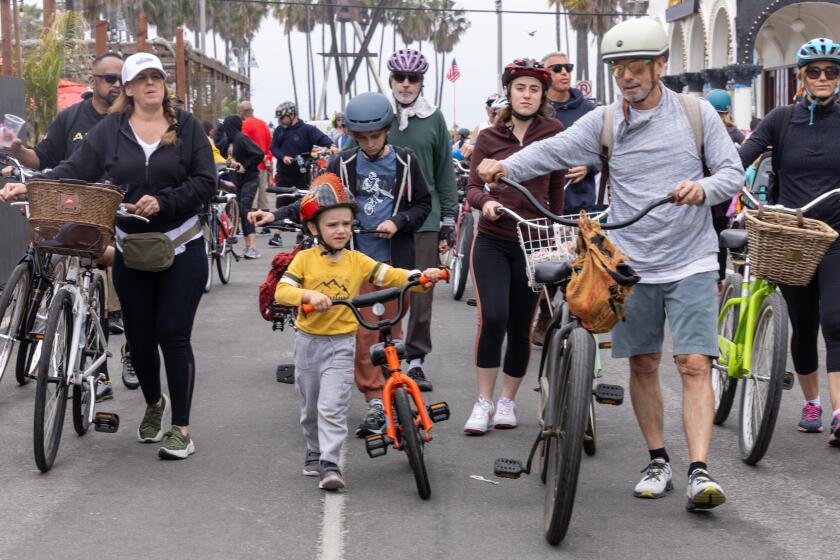To him, disease a blessing
Next time you’re complaining about a migraine, an upset stomach because of too much fast food or a bout of the flu, try walking in Grant Dewey’s crutches for a day.
The eighth-grader has undergone 15 surgeries since birth. In January, he was under the spell of anesthesia for nine straight hours as surgeons in West Palm Beach, Fla., fixed his right leg.
Now he can finally bend it, and he doesn’t have to walk straight-legged anymore.
And you think that broken ankle is a big deal?
Grant has broken his leg eight times, and he’s just beginning to make a comeback from the surgeries in Florida, where he missed 80 days of school but still managed to keep up with his classes.
Born with a birth defect known as spina bifida, the Mariners Christian School student is thankful that he can actually walk. Roughly 90% of children afflicted with the spinal disease are paralyzed below the waist, he said in an interview Tuesday.
On June 17, the day of “graduation” from eighth grade, Grant hopes to shuck his crutches and walk across the stage in the gym to receive his middle-school diploma.
While others hope to achieve academic success — something that comes naturally to Grant, an A student — his goal is more on the physical level.
Next stop after that is Sage Hill School.
“My whole view through all this is I think it’s a blessing that I was born with this,” said Grant, 14, who some day hopes to become a neurosurgeon so he can spot children with similar spinal problems and then help them. “I’ve helped raise over $8 million for spina bifida research. I go to Congress every other year in Washington, D.C., and lobby for more money and help.
“We need it.”
That’s hardly language typical of an eighth-grader, but Grant hasn’t lived the typical eighth-grader life. During the last pair of marathon surgeries, he said he lost 120% of his blood supply and had eight transfusions.
“My lungs almost stopped working,” he said, “and I spent two weeks in intensive care. I was on heavy antibiotics for two months.”
In fact, Grant drops scientific terms like “fusion,” “scar tissue,” “tibia” and “femur” as one who’s long grown accustomed to the inner workings of the body and countless doctor visits.
At age 8 months, he was diagnosed with the spinal defect, where scar tissue masses at the base of the spine. It cuts off the blood supply to the lower half of the body, robs children of any sort of feeling below the waist and paralyzes them.
Yet somehow since childhood, Grant has been able to move his legs, playing T-ball and other childhood sports.
The activities took their toll. One day his knee began to swell up, he said, “like a grapefruit.”
“We just didn’t know how bad it was.”
Enter all the doctors and nurses and bouts of physical therapy into his life, which is a work in progress, although these days he’s getting along fine, he said.
Of course, there’s always that fear that the scar tissue in his spine might decide to come back and grab onto the nerves in his body. Grant, it would seem, is always on call for an operation.
“I’m afraid it’s never a sure thing,” he said.
But he doesn’t dwell. He moves forward. He skis in Breckenridge, Colo., so that when the Paralympics rolls around, he’s ready for it.
He’s been mono skiing for the last six years. You can check him out on YouTube at www.youtube.com/watch?v=bs1y1uBzUPk.
“I’m really looking forward to riding a bike,” he says.
Says Marge Hoffman, an administrative assistant who sees Grant daily at the school: “The kid is, you know what he is? What’s the word I’m looking for? Not a role model, but an example to all of us.
“His will is to continue, to never stop. He’s a breath of fresh air every time I see him coming.”
When asked whether Grant would be able to walk across the stage on his own come graduation day, Tom Wisenbaker, his strength trainer, said, “Oh, yeah. I really believe so. That kid has really been through it. He’s an amazing human. He’s got tons of drive and desire.”
All the latest on Orange County from Orange County.
Get our free TimesOC newsletter.
You may occasionally receive promotional content from the Daily Pilot.



